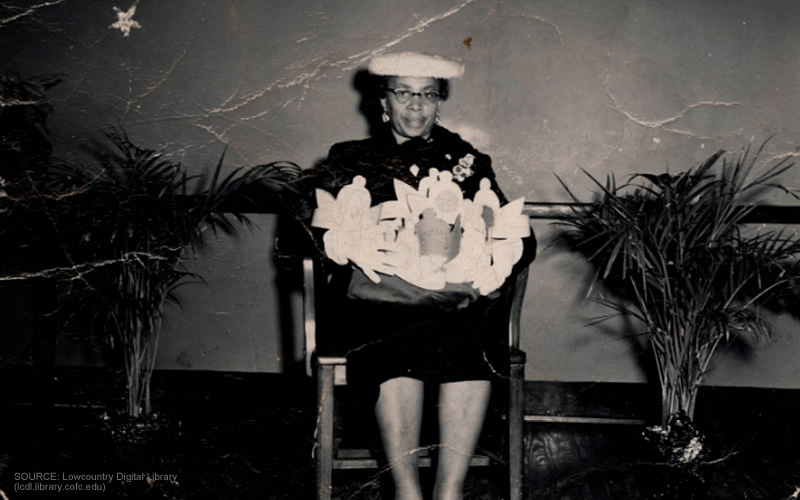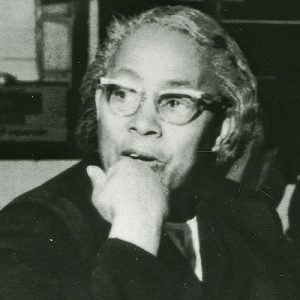
Septima Poinsette Clark in 1956 after a testimonial dinner by her sorority. She noted, however, in a memoir that her sisters didn’t want to get their picture taken with her then because she was controversial and they were scared they’d lose their jobs. (She had recently been fired for being a member of the NAACP.) Photo from the Lowcountry Digital Library.
By Andy Brack, editor and publisher | All South Carolinians – white, black, brown, newcomer and native – can stand to learn more about a real homegrown patriot, the late Septima Poinsette Clark.
 The mere mention of her name today invokes reverence in the black community. But white Southerners seem to forget that she was so respected for her work in the civil rights movement that Dr. Martin Luther King Jr. asked her to accompany him to Oslo, Norway, in 1964 when he accepted the Nobel Peace prize.
The mere mention of her name today invokes reverence in the black community. But white Southerners seem to forget that she was so respected for her work in the civil rights movement that Dr. Martin Luther King Jr. asked her to accompany him to Oslo, Norway, in 1964 when he accepted the Nobel Peace prize.
“In a sort of casual way, he would say, ‘Anything I can’t answer, ask Mrs. Clark,’” she recalled in a 1986 memoir.
From 1916 when she was 18 until she was fired 40 years later with 41 others in Charleston County for being a member of the NAACP, Clark was a teacher, first on John’s Island and then in Charleston, McClellanville, North Carolina, Columbia and again in Charleston.
While some peers got their jobs back, Clark left Charleston and opened a period of her life that was pivotal for the civil rights movement. When most people her age were starting to slow down, Clark became the director of workshops at the Highlander School in Monteagle, Tenn., an integrated training center where people learned about civil rights. One of her students was Rosa Parks.
Highlander also was the place where Clark fostered the notion of citizenship schools. In these often quiet, after-hours schools, illiterate black citizens learned to write their name in cursive and learn basic reading skills so they could pass a test to get registered to vote. The first opened in 1957 on John’s Island in two back rooms fronted by a grocery store run by the area’s Progressive Club, an organization started by Esau Jenkins, one of Clark’s former students.
After a 1959 raid on Highlander led to its closure, the Southern Christian Leadership Council and King adopted citizenship schools and expanded them with Clark as their chief organizer. Hundreds of thousands of blacks registered to vote as Clark and peers moved across the deep South training people to run citizenship schools.
“There were 897 [schools] going from 1957 to 1970,” wrote Clark, often called the “mother of the Movement.” “In 1964 there were 195 going on at one time. They were in people’s kitchens, in beauty parlors, and under trees in the summertime. I went all over the South, sometimes visiting three Citizenship Schools in one day, checking to be sure they weren’t using textbooks, but were teaching people to read those election laws and to write their names in cursive.”
By the mid-1960s, Clark estimated 700,000 black voters registered across the South. Following passage of the Civil Rights Act of 1965, another million registered by 1970. Two years later, two African Americans became the first Southerners elected to Congress since Reconstruction – Barbara Jordan of Texas and Andrew Young of Georgia, who worked with Clark in the SCLC.
“I look back at the period of the late fifties and sixties as being a watershed period in American history,” Clark wrote. “ We underwent a tremendous upheaval of change, and we did it with very little destruction. The movement itself was essentially non-violent. We consciously taught the message that we all lose when there is violence, and we can all win if we can find a way to resolve our differences without being destructive. I think the civil rights movement really demonstrated that.”
In 1970, Septima Clark retired from the SCLC, only to move back to her beloved Charleston after years of fighting for what many of us take too much for granted. She soon was elected to the county school board and feted by a U.S. president. She passed away in 1987 at the age of 89.
“In my later years,” she wrote, “I am more convinced than ever that in lifting the lowly, we lift likewise the entire citizenship.”
During this Thanksgiving season, I am thankful for Septima Poinsette Clark and her life’s work. She reminds us what freedom is, how strong it can be and how fragile it may be. Now, more than ever, we need more Septima Clarks to make our country better.
- Have a comment? Send to: editor@charlestoncurrents.com




 We Can Do Better, South Carolina!
We Can Do Better, South Carolina!
























